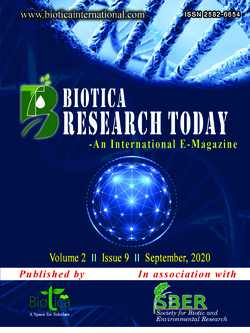
Future of AI in Agriculture
Monika Karnawat*
Career Point University, Alaniya, Kota, Rajasthan (324 005), India
S. K. Trivedi
Career Point University, Alaniya, Kota, Rajasthan (324 005), India
Deepak Nagar
Career Point University, Alaniya, Kota, Rajasthan (324 005), India
Rohitashv Nagar
Career Point University, Alaniya, Kota, Rajasthan (324 005), India
DOI: NIL
Keywords: Artificial intelligence, Climatic varieties, IoT, Precipitation
Abstract
Worldwide populace is relied upon to arrive at in excess of nine billion by 2050 which will require an expansion in horticultural creation by 70% so as to satisfy the interest. Just about 10% of this expanded creation may originate from accessibility of unused terrains and rest of 90% ought to be satisfied by increase of current creation. In this, utilization of most recent innovative answers for make cultivating more productive, stays probably the best need. The shortage and expanding work costs, raising expense of development and harvest disappointments related with flighty yield because of ailments, disappointment in precipitation, climatic varieties and loss of soil ripeness. Using artificial intelligence we can develop smart farming to minimize loss of farmers and provide them with high yield. Using artificial intelligence, one can gather large amount of data from government and public websites or real time monitoring of various data is also possible by using IoT (Internet of Things).
Downloads
not found
Reference
Onishi, Y., Yoshida, T., Kurita, H., Fukao, T., Arihara, H., & Iwai, A., 2019. An automated fruit harvesting robot by using deep learning. ROBOMECH Journal, 6(1):13.
Thompson, L.J., 2017. Using drone based sensors to direct variable-rate, in-season, aerial nitrogen application on corn. International conference on Ad-hoc and networks and wireless. 165-174
Ekta J., Deep S., Neelam S., Namrata C., 2020. Revolution of Indian Agriculture through Drone Technology. Biotica Research Today, 2(5):174-176.
